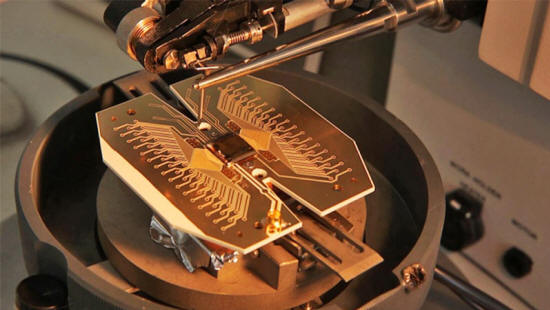Launched in April 2016 as part of an apparently unrelated initiative in cloud-computing, the quantum project is the European Commission's latest decade-long, billion-euro initiative.
Yet, the two previous EU mega-projects - the Graphene Flagship and the Human Brain Project, both announced in 2013 - have yet to fully prove their value.
The latter has been plagued by disputes over its leadership.
And both have had difficulty drumming up complementary investment from member states, says Tommaso Calarco, a physicist at the Centre for Integrated Quantum Science and Technology at the Universities of Ulm and Stuttgart in Germany, and another adviser on the steering committee.
The Quantum Technology Flagship will work differently, he says. Rather than run largely as a closed consortium selected at the project's outset, it will operate with open calls throughout.
He says that this should ensure high levels of competition, and offer the flexibility to fund the best researchers throughout. And he hopes that it will encourage member states to invest nationally to make stronger bids for funding.
Some European countries show signs of supporting the project.
Hungary, Austria and Germany have all announced their own national quantum-technology programs since the flagship's launch. The German initiative, called QUTEGA, is currently in a pilot form, but is likely to be worth around €300 million over 10 years.
Initial projects include miniaturized magnetic sensors, which pick up tiny electric currents and could be used to monitor the brain during surgery, as well as small, transportable, high-precision atomic clocks, says Gerd Leuchs, a physicist at the Max Planck Institute for the Science of Light, Erlangen, and coordinator of the project.
Product potential
The European flagship will focus on four quantum technologies:
communication
computing
sensing
simulation
It will also incorporate basic science.
Although Europe produces some of the best research in these fields, other regions file more patents, says Martino Travagnin, who, along with his colleagues at the European Commission's Joint Research Centre in Ispra, Italy, has analyzed patenting in quantum technologies.
China currently dominates in quantum communication, which uses quantum properties of particles to develop shared secret keys for encryption.
The country holds the most patents in the field and is already trialing both a quantum-communication satellite and a 2,000-kilometre secure ground-based link.
And the United States leads on patents in quantum computing and ultra-sensitive sensors.
Companies are involved with the EU project, Vladimir Buzek told the meeting, with 12 representatives on the expert group.
"But industry seems like it's just waiting for what the academy is going to produce, and then at some point, it's willing to take the result," he said.
Although EU companies might lack the cash to dive into quantum technologies, as their US counterparts have done, smaller companies could invest in producing crucial components, he said.
Brexit problems
One problem facing the quantum-flagship scheme is the possible loss of the United Kingdom, one of Europe's strongest research communities in quantum technology.
(Following the Brexit vote, the United Kingdom is scheduled to leave the European Union in 2019, the year in which the first projects kick off.)
The United Kingdom is one of the few nations to involve relevant companies in the research, Calarco points out, through its £350-million (US$450-million) UK National Quantum Technologies Program.
He hopes that the United Kingdom will be able to continue in some capacity - either by paying into the European funding pot, as Switzerland does, or through a match-funding model.
The timing of the project should also play in its favor, he notes. A UK government commitment to underwrite funding for existing EU projects means that the early years of investment will be guaranteed.
The next round should start sufficiently long enough after the Brexit negotiation for a solution to have emerged.
"Given the circumstances, this is the best timing we could imagine," he says.


